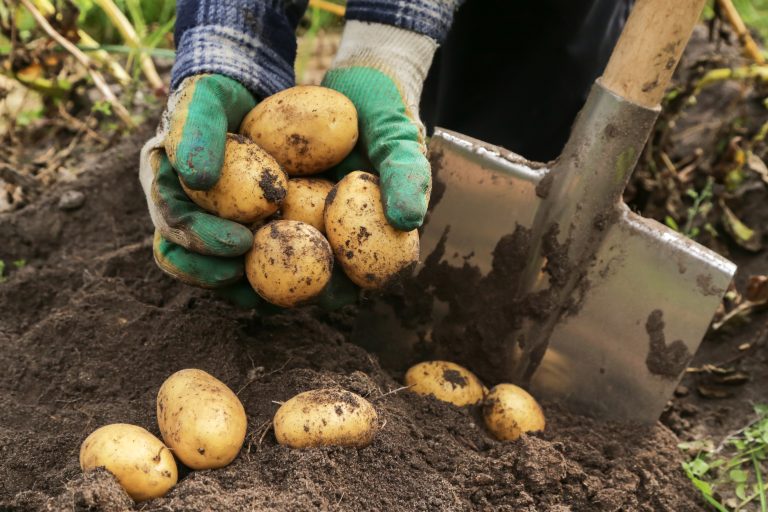The cost of potatoes in the UK has surged to its highest level in three decades, with prices expected to exceed £1 per kilogram. Industry experts warn that shortages of popular varieties are likely in the coming months, as a combination of poor weather and delayed planting continues to impact the nation’s potato supply.
The UK potato industry, already facing challenges from wet weather over the past 18 months, is now contending with the consequences of what many are calling “spudflation.” With some regions experiencing the wettest conditions since records began in 1836, farmers are grappling with waterlogged fields, leading to delays in planting and concerns about the upcoming harvest.
The nation’s leading potato supplier, Albert Bartlett, confirmed that the unusually wet conditions, coupled with a cold spring, have created significant challenges for growers. Paddy Graham-Jones, the company’s technical director, described the situation as a “gap between the stored crop and the new season crop” due to delayed spring planting. He noted that planting in Cornwall, which typically begins much earlier in the year, only commenced this week – a full two months behind schedule.
“There will be shortages of some varieties,” said Graham-Jones, adding that consumers may notice Jersey potatoes becoming more prevalent on supermarket shelves as suppliers shift to available stock. “We knew the industry was short due to the limited 2023 crop, and we had hoped for a dry spring and early plantings to fill the gap. Unfortunately, that hasn’t been the case.”
This disruption to planting schedules means that the new season’s crop, typically available in June, may not be ready for harvest until much later. “With planting only now underway in April, it means the usual early crop won’t be available as expected, leading to potential gaps in supply,” Graham-Jones added.
Suppliers are already facing difficulties in meeting demand, with some beginning to limit the number of orders they can fulfil. This is reflected in the Consumer Price Index, which shows that the average price of potatoes has risen to 84p per kilogram, the highest since August 2014. However, prices are projected to surpass £1.03 per kilogram in the coming months, a level not seen since the early 1990s. The last significant price increase occurred following a particularly wet summer in 2012/2013, a period now being echoed in the current situation.
Across the Irish Sea, the Methodist Church in Ireland has even called on its congregations to “pray for better weather” to ease the crisis. According to a report in the Financial Times, the church has asked worshippers to pray for both improved conditions and an appropriate government response to the growing issue.
In a statement released this week, the UK’s Agriculture and Horticulture Development Board (AHDB) warned that the wet weather is likely to affect the cost of other staples such as bread and cooking oils. The board, which monitors farming practices and crop yields across the country, said that rising costs are inevitable as the agriculture sector continues to battle with unpredictable weather patterns and supply chain disruptions.
Experts are warning that the current weather patterns, which have seen heavy rainfall in some regions and prolonged cold spells in others, are becoming more frequent. With more volatile weather conditions predicted in the coming years, farming organisations such as the Soil Association and the National Farmers Union (NFU) have been vocal in calling for increased government support to help farmers adapt.
The NFU has been advocating for additional funding to support farmers in managing the impacts of climate change, particularly in mitigating the effects of flooding and promoting more resilient farming practices. “The long-term sustainability of UK farming is at risk if we don’t address these challenges head-on,” said a spokesperson for the NFU.
The Soil Association echoed these concerns, highlighting the need for more investment in sustainable agricultural practices. “Farmers are at the forefront of the climate crisis, and we need to provide them with the tools and resources to adapt to changing weather patterns,” said a representative from the organisation.
As the UK braces for further price hikes and potential shortages, the potato crisis serves as a stark reminder of the challenges facing the agriculture sector in the face of climate change. Consumers are being urged to remain patient as the industry navigates the difficulties posed by the weather, while industry leaders continue to call for increased support to protect the future of UK farming.
With the spring season now well underway, the coming months will be critical in determining the full extent of the impact on the potato supply and other essential food items. Farmers, suppliers, and consumers alike are waiting anxiously to see how the situation unfolds, with hopes pinned on improved weather conditions to bring some much-needed relief to the sector.

